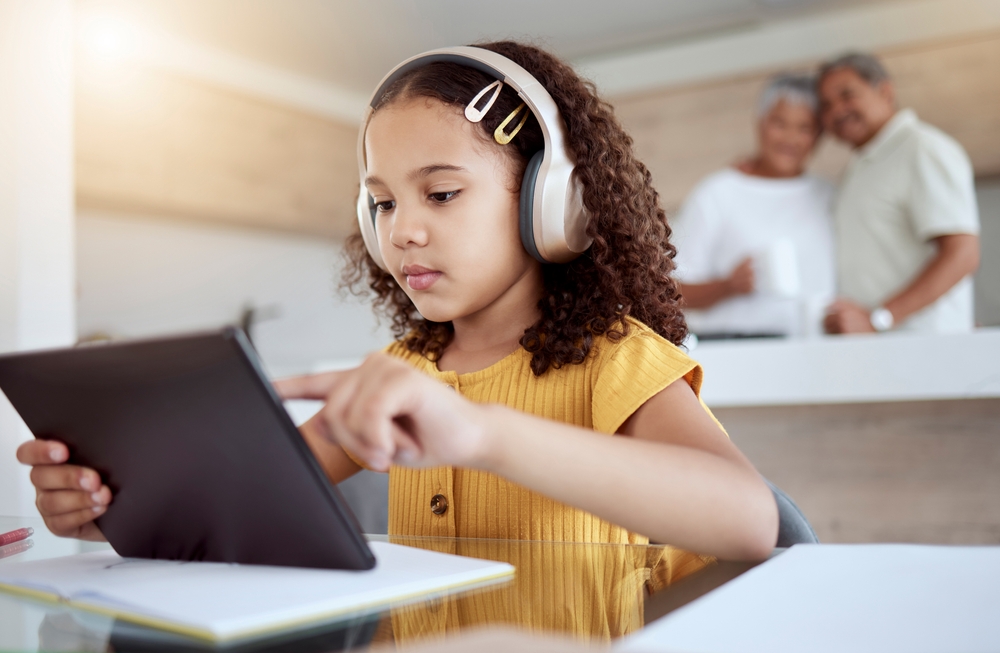
Reading skills build throughout each grade level. Even high school students accumulate new vocabulary and critical thinking skills that enable them to find deeper meanings in books and texts. As children move into new grade levels, they will add new layers of knowledge as they gain more confidence and proficiency in their reading.
Some children cannot seem to read enough books, while others struggle to read at appropriate grade-level benchmarks. For parents who want to help foster more opportunities for literary engagement at home, elementary school leveled reading apps could be used to guide a child’s reading journey.
A leveled reading app isn’t the same as free apps that parents might be able to download via their smartphone or their tablet. A leveled reading app serves as a reading tutoring program. These apps aren’t just designed for struggling readers, though. All children can use a leveled reading app at home.
How Apps Marry Tech with Learning
Some parents are very strict about how much time their child can spend using a screen. As tech has wired into education, many children now spend the majority of their school day looking at a computer or Chromebook.
Many teens and middle school students also have access to a smartphone. Not only does this allow them to be in contact with parents as necessary, but the smartphone also serves as a digital social outlet for gaming, music streaming and conversations with friends.
Tweens and teens are spending more time eyeballing those screens. According to 2021 data from Common Sense Media, tweens spent five hours and 33 minutes on screens and teens spent more than eight hours everyday on screens.
Since technology has become a part of daily life, many teens, tweens and children are quite comfortable using those devices to help them navigate their social life and complete their homework assignments. Music is digital, and even books are digital.
Tech and screens don’t have to be the enemy of parents. Positive screen time refers to using these devices to engage in academic activities that can help children become more proficient in math, reading and other subjects, too.
Leveled reading apps are designed to help children boost their reading proficiency, increase their vocabulary knowledge and think deeper about stories and books that they read. How do these apps work?
Every reading app might feature a unique or proprietary design. When parents are researching leveled reading apps, they should understand that each app is different. Some might focus more on one literacy skill, while other apps could be designed to help with all aspects of reading.
Elementary Leveled Reading Apps Should Guide Each Child
A leveled reading app should begin lessons at a reading level that is appropriate for each individual. Leveled reading apps are designed to increase in difficulty as the child demonstrates proficiency and mastery.
Children who struggle with reading or even those who read confidently shouldn’t be bumped to a harder level simply based on if they read a certain number of books or completed a specific number of lessons. To ensure that children are prepared for harder texts, they need to demonstrate that they can read their current books fluently without error and that they can answer questions related to the story.
Comprehension is a major component of literacy. In early grade levels, reading comprehension might only focus on w/h questions about the story (who, what, where, when, why and how). In higher elementary grades, comprehension might become a bit more abstract; children might be expected to read between the lines (inferencing) and make predictions, too.
Again, all reading apps are designed differently in how they measure reading fluency and reading comprehension. Readability is designed with a built-in AI tutor that listens to children as they read and is programmed with voice recognition software.
Children read stories aloud when they are using Readability. AS the child reads, the tutor is listening for errors and provides help as needed. In addition, the tutor calculates how many words a child is reading per minute (this is denoted as reading fluency).
Readability provides a library of books for each reading level. Parents can set their child’s reading level, or the program can work with the child to determine the best base line reading level. It’s important that children start at the right level to ensure that the books they are reading aren’t too easy or too difficult for them.
How Is Reading Comprehension Measured by an App?
Reading fluency is easy for apps to measure; again, Readability’s tutor listens for mistakes and is measuring the words read per minute every time a child reads via the program. How does Readability help children who struggle with comprehension? How does an app know that a child understands what they are reading?
Comprehension quizzes might be a part of an app’s learning structure. Readability’s tutor asks questions at the end of each book to measure a child’s understanding of what they read.
These quizzes, though, also help reinforce other reading strategies and skills. For example, if a child answers a question incorrectly, Readability shows them the importance of re-reading to gain knowledge. The AI tutor will show the child a section of the story that offers clues about the answer, and the tutor reads this aloud. The child is given another opportunity to answer the question.
Sometimes children read too fast or they read without thinking about the story. When children are assessed at the end of each story, the tutor helps them understand the importance of re-reading sections that perhaps they didn’t understand.
Not all reading apps might teach comprehension in the same way. However, parents who feel that their child needs to work on their reading comprehension might research how apps are designed to measure a child’s understanding of what they read and how the program assists children with reading comprehension.
If children don’t show mastery of both reading fluency (decoding) and reading comprehension, Readability will not advance them to the next reading level. Some children need more guidance at a particular level, and they might take longer to demonstrate reading proficiency at a particular level.
Children who are using Readability and who don’t have reading struggles also could feel stuck at a certain level. Again, sometimes it could take longer for a child to demonstrate full mastery at a particular level.
A second grader who is reading at a fourth grade level might not be prepared to advance up to fifth grade books. They might just need to continue working on their reading skills at their current level. In time, though, children should advance.

A Leveled App Should Advance Vocabulary Skills
While reading success might focus on comprehension and decoding, vocabulary skills can help increase a child’s reading comprehension or aid their comprehension. Learning the meaning of more words can help children understand the underlying context of what they are reading. One word could make all the difference in a sentence or even in understanding the meaning of an entire paragraph.
Elementary school reading apps should help children work on their vocabulary skills and the mastery of these skills. With Readability, every book in a child’s leveled library includes a vocabulary list. In addition, children can tap any word in a story to hear the word’s definition or hear it used in a sentence.
Children always have access to their comprehensive list of vocabulary words. They can review their list and hear the meaning of words again and again to gain mastery.

Sign Up for a Free Trial to Understand Apps
Parents might be unsure about which leveled reading app is best for their child. Many apps offer a free trial period that allows children to explore the program at no cost.
For parents who are interested in exploring Readability with their child, a free seven-day trial period provides full access to the program; children can even work with the reading tutor. Sign up for a free trial today to meet the tutor and find out why Readability is the best leveled reading app.

 Español
Español